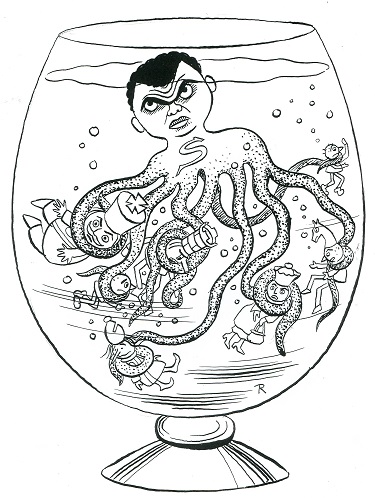
Ivan Sokolov heeft samen met Predrag Nikolic, Sergei Tiviakov en Roberto Cifuentes het Nederlandse schaak aan het eind van de vorige eeuw een impuls gegeven. Ivan nam in 1994 voor het eerst deel aan het Nederlands kampioenschap (gedeeld vierde/vijfde plaats) en won een jaar later met de fenomenale score van 9½ uit 11 zijn eerste titel. Op onze website staat bij de geschiedenis van het Nederlands kampioenschap te lezen: “Het Wolters Kluwertoernooi vindt opnieuw plaats in het Amsterdamse debatcentrum De Balie. Ivan Sokolov start met 6 uit 6. In de elfde en laatste ronde moet Jeroen Piket winnen van koploper Sokolov om een beslissingsmatch af te dwingen. Lange tijd lijkt hij daarin te slagen, maar uiteindelijk verzandt zijn kansrijke winstpoging in remise. Zo wint de Bosniër Sokolov de titel Nederlands kampioen, 8500 euro, een fiets en een schaakklok.” Ruperts cartoon slaat op dit kampioenschap, waarin elke arm van de octopus een overwinning voorstelt. Samen met de drie remises, was dat voldoende voor de titel.
Weer een jaar later eindigde Sokolov gelijk met Jan Timman, maar verloor de beslissingsmatch (zie Sokolov-Timman 1996 in deze serie). In 1998 won Ivan met 9 uit 11 het Nederlands kampioenschap, een heel punt voor Timman. Na afloop van elke speelronde laafde hij zich met vriend en concurrent Jan Timman aan de witte wijn. Niet voor niets besloot Ivan om naast het schaken ook wijn te gaan importeren.
In de 21ste eeuw ging hij steeds minder toernooien spelen. Hij vestigde zich met vrouw en kinderen in Lelystad en hij ging zich meer toeleggen op het geven van trainingen en het schrijven van schaakboeken. Zo was hij onder andere trainer in de Verenigde Arabische Emiraten en in Iran. Ook in het Max Euwe Centrum geeft hij jaarlijks training, als zijn agenda en buitenlandse reizen dat toestaan. Zijn boek Winning Chess Middlegames: An Essential Guide to Pawn Structures (New in Chess) wordt gezien als een ‘klassieker’ en zijn driedelige serie Chess Middlegame Strategies (Thinkers Publishing) heeft ook zeer goede recensies gekregen. (ES)
Ivan Sokolov
Together with Predrag Nikolic, Sergei Tiviakov and Roberto Cifuentes, Ivan Sokolov gave a boost to Dutch chess at the end of the previous century. Ivan took part in the Dutch Championship for the first time in 1994 (shared fourth/fifth place) and won his first title one year later with a phenomenal 9½/11 score. On our website, the following can be read about the history of the Dutch Championship: ‘The Wolters Kluwer tournament again took place in the debating centre De Balie in Amsterdam. Ivan Sokolov started with 6 points out of 6. In the eleventh and final round, Jeroen Piket had to beat the leader, Sokolov, to force a playoff match. For a long time it looked as if he was going to succeed, but eventually his promising winning attempt petered out to a draw. And so, the Bosnian Sokolov won the Dutch title, 8500 euro, a bicycle, and a chess clock.’ Rupert’s cartoon refers to this championship, in which each arm of the octopus signifies one victory. Together with his three draws, this was sufficient for the title.
One year after that, Sokolov ended equal with Jan Timman, but lost the playoff match (see Sokolov-Timman 1996 in this series). In 1998, Ivan won the Dutch Championship with 9 out of 11, a full point ahead of Timman. After each round he refreshed himself with white wine together with his friend and rival Jan Timman. It was not for nothing that at one point Ivan decided to start importing wine besides being a chess professional.
In the 21st century, Ivan played less and less in tournaments. He settled in the Dutch city of Lelystad with his wife and children, and focussed more on giving trainings and writing chess books. Among others, he worked as a trainer in the United Arab Emirates and in Iran. Also in the Max Euwe Centre he gives annual trainings, when his agenda and travels abroad allow it. His book Winning Chess Middlegames: An Essential Guide to Pawn Structures (New in Chess) is considered a classic, and his three-volume series Chess Middlegame Strategies (Thinkers Publishing) has also received very favourable reviews. (ES)